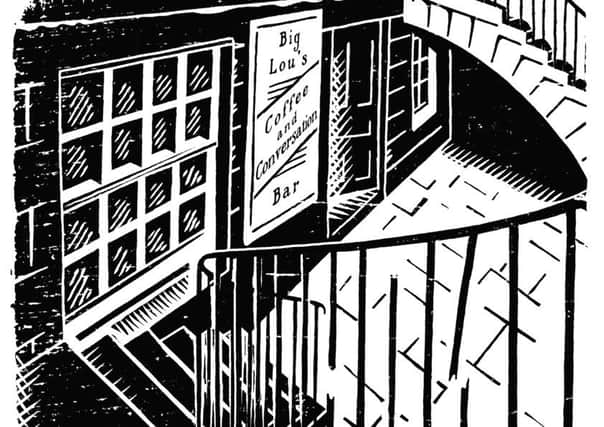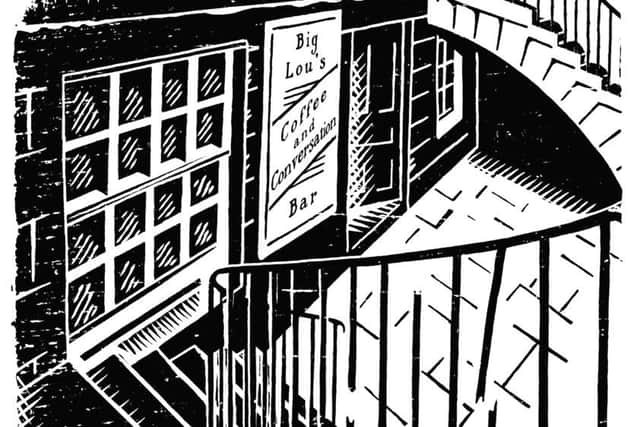44 Scotland Street: Big Lou makes a change


And when spring eventually arrived – in May that year – she was ready for the transition. It was a brief spring, modulating within weeks to full-blown summer, but in that short period she made a number of important decisions.
The first of these was that she would change the name of her coffee bar. She had never been entirely happy with The Morning After Coffee Bar as a name. It was suggestive, first and foremost, of a hangover – something that, for most people, had entirely negative associations. Then there was a slight whiff of guilt to it: the morning after, even if one had not been drinking, could be a time of regret for what had been done the night before – for an unfortunate encounter or a tactless word. What was needed, she felt, was something that played to the particular appeal of her coffee bar. The result was Big Lou’s Coffee and Conversation Bar, a name that was welcoming on several counts. The inclusion of a reference to the owner in a business name made everything more personal. If we go to Harry’s Bar, for instance, we know that a friendly host awaits us; if we enter a restaurant called Marco’s, we know that Marco will be there to ensure that all goes well. Less reassuring are those establishments where the noun is not a proper one. It is unwise to eat in a restaurant called Mama’s, or, even more so, Doc’s. In each case the claim is probably suspect: there will be no mama in Mama’s and anyone called Doc is surely apocryphal.
Advertisement
Hide AdThe new name told you what you might expect if you descended those somewhat hazardous steps that led down from the Dundas Street: Big Lou, coffee, and conversation. Those steps, of course, had a history, particularly when the coffee bar was still a bookshop: it was on the fourth step from the top that the Christopher Murray Grieve, the poet Hugh MacDiarmid, tripped. He did not fall far, and was unharmed; other literary figures had been less fortunate, although none as unfortunate as the late Lard O’Connor, who succumbed to a heart attack half way down and could not be resuscitated even if an ambulance arrived within minutes. The heart attack had nothing to do with the steps, of course, since Lard was descending rather than ascending when it struck him; it had everything to do with the Glasgow diet, with year after year over indulgence in fried foods, sugar, and a complete lack of exposure to anything green. In fact, Lard had been heard to say that green things were generally poisonous, and that those who ate vegetables were asking for trouble, although he exempted onions from this category as they could be made palatable if covered in batter, fried, and served as onion rings.


If you reached the bottom of the steps unharmed you would then find Big Lou and the promised conversation. Big Lou would not have been described as unduly chatty – where she came from there was a general reluctance to use words unnecessarily – nae time fur Marcel Proust, as the common Angus saying has it – but she was always prepared to engage with any customer who wanted to pass the time of day or even to move on to meaty issues. When Big Lou had bought the premises, she had acquired the stock of second-hand books still on the shelves, and had transferred them to her flat in Canonmills. There she had started to work through them, title by title, with all the determination of the auto-didact. So it was that she could discuss the philosophical theories of David Hume, Adam Smith and, with great enthusiasm, Thomas Reid; so it was that she had read the first four volumes of the Scott Moncrieff translation of Proust; and so it was that she was familiar with George Davie’s The Democratic Intellect and Professor Youngson’s The Making of Classical Edinburgh. Occasionally – very occasionally – a customer might share her interest in these matters and an exchange of ideas might result, but more often people simply looked blank if Big Lou mentioned any of these saliences in Scottish intellectual history.
She wondered about this. “Do folk know anything any more?” she once asked Angus Lordie.
And Angus replied, “Depends on how old they are, Lou.”
“What’s that got to do with it?”
Angus shrugged. “It all depends on what schools teach. I’m not sure how much that is, these days.” He paused. “Are we producing people who are more literate and better-informed than they used to be? I don’t know, Lou, but somehow I hae my doots.”
For Lou, it was a question of facts. “Geography, Angus? Capitals of the world? Major rivers? Contour lines?”
Angus shook his head. “I’m not sure any of that is taught any more, Lou.”
“Robert Burns?” she said.
Advertisement
Hide AdAngus shook his head again. “They don’t learn poetry. Not off by heart.”
“Why?”
“Could it be ...” Angus hesitated. “Could it be that the teachers …”
“Dinnae ken any themselves?” prompted Big Lou.
Angus scratched his head. “I don’t know, I’m afraid.”
Big Lou sighed. “Are we facing a new Dark Age, Angus?”
Advertisement
Hide Ad“Possibly, Lou. A dark age in which our concentration spell is this long.” He held up his little finger. “And there’s another thing, Lou – I heard the other day that in some schools in America they were no longer teaching children handwriting. Kids can’t write any more.”
“What do they do?”
“They print. Or they type on their iPads. But no actual cursive script.”
Big Lou thought for a moment. “And their signatures? How will they sign things?”
“They’ll make a mark,” said Angus. “Just like the old days. Or I suppose they could print their names.”
“And is it true that teachers don’t bother about correcting spelling mistakes any more?”
“People say that. But then, a lot of people sound off about these things without knowing what they’re talking about.”
Advertisement
Hide AdAngus finished his coffee and wiped the milk from his lips with his handkerchief. “Oh well, Lou, O tempora, O mores …” He paused. “Not that one would say that to the teachers.”
FOLLOW US
SCOTSMAN TABLET AND MOBILE APPS